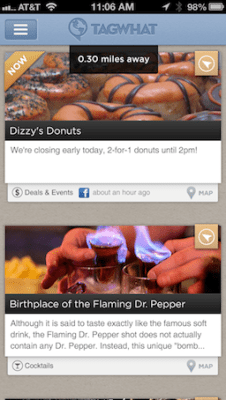Tagwhat is a mobile startup trying to present users with content that’s relevant to their location — descriptions of nearby points of interest, social network messages related to those locations, and now, with the latest app update, with local deals and events.
The deals are pulled from Facebook and other social networks, and then recommended to users based on the time and location. Co-founder and CEO Dave Elchoness argued that this approach is significant because it means a user can see relevant deals without having to follow a bunch of different businesses on Facebook and Twitter. At the same time, the businesses get access to potential new customers (rather than just promoting themselves to existing fans), and they don’t have to change their behavior at all — which also means that Tagwhat doesn’t have to go out and recruit a bunch of businesses.
The idea of deal aggregation isn’t new, but Elchoness pointed out that Tagwhat has developed its own technology to not just pull the content from social networks, but also to understand the content well enough that it can recommend “the right content at the right place at the right time.” For example, when I opened the app this morning, I saw a bunch of Super Bowl happy hour promotions from nearby bars.
“Sometimes too many choices is acutally more confusing,” Elchoness said. “If there are a hundred places around me that are restaurants, it’s really hard to make a decision. If we call out the places that have an actionable opportunity, that reduces the number of choices, but it’s still extremely satisfying.”
This addition is just part of a larger redesign to the Tagwhat experience, which allows users to browse all of the app’s content in a real-time feed. By default, Deals & Events are just one of a number of “channels” adding content to the feed, but you can also focus specifically on deals if you want. Elchoness said the company is looking at a number of different ways to monetize the feed, such as syndicating it with different content partners.
Elchoness also acknowledged that he doesn’t have any official deals with the social networks, but he said that he’s directing traffic back to businesses’ Facebook pages (for example), “so I can’t imagine why they would object to our making their product just so much more engaging in the context of a location.”
